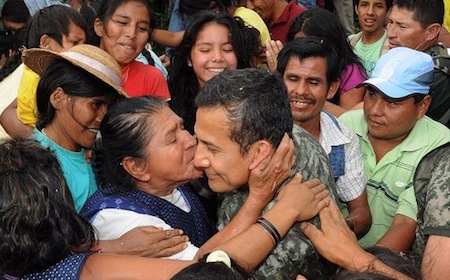July 28 marked the one-year anniversary of Ollanta Humala (pictured above) as Perú’s new president — and it was marked by the appointment of Humala’s third prime minister since taking office.![]()
The fear that many Peruvians had about Humala’s administration turned out to be a non-issue — whereas many Peruvians once feared that Humala would disrupt a decade-plus of staggering economic growth by turning Perú toward charisma nationalism. Although the Peruvian economy keeps chugging along, however, social unrest has turned out to be a thornier problem for Humala.
The 2011 presidential campaign ended in a runoff between the two most polarizing candidates among five plausible presidents: the leftist Humala, the 2006 runner-up and a former Army officer, and Keiko Fujimori, the daughter of Alberto Fujimori, Perú’s president in the 1990s. Mario Vargas Llosa, the Peruvian Nobel laureate, famously compared the choice as being akin to terminal cancer and AIDS — despite reservations about Humala, Peruvians also worried that Fujimori would pardon her father, currently in prison for committing embezzlement and for committing human rights abuses during his time in office, unleashing demons from an era that many Peruvians would rather not revisit.
When Humala won by a 3% margin, however, he moved quickly to assure Peruvians that he wouldn’t disrupt the booming economy, promptly appointing as his finance minister Luis Miguel Castilla, a deputy finance minister from the previous administration of Alan García. Far from nationalizing Peruvian industry, Humala has essentially left economic policy unchanged from his predecessors of the past decade.
Félix Jiménez, Humala’s top campaign economic adviser, who briefly served as a presidential economic adviser, left Humala’s government in January 2012, and has since criticized Humala for being too beholden to orthodox economic policy and Peruvian economic elites. Another former adviser, Oscar Dancourt, a former acting Central Bank president, also left the administration.
Those resignations were also, in part, a response to a December reshuffle that brought Oscar Valdés — an army officer and former military colleague of Humala’s — to power as prime minister. His appointment caused several prominent leaders, including former president Alejandro Toledo, to decry the growing militarization of the Humala administration.
Valdés’s resignation last week, and his replacement by Peruvian justice and human rights minister Juan Jiménez, seems calibrated to adjust to many of those criticisms, which are tied to some of Humala’s biggest problems. Jiménez had increasingly become a key troubleshooter for Humala, especially in contrast to the increasingly unpopular Valdés.
Chief among those problems, however, are the protests that have emerged in the mostly-indigenous Cajamarca and surrounding region in the northern highlands (in South America, as far as culture goes, it is said that altitude often matters more than nationality, but that holds true for politics and economic policy as well). Continue reading One year into the administration of Perú’s Ollanta Humala: a mixed bag
